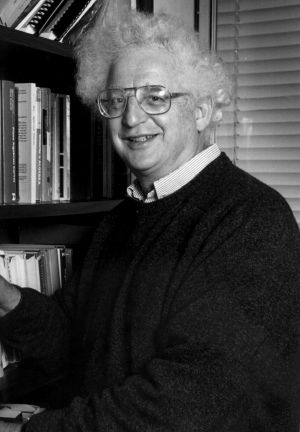 |
 |
 |
|
 David Epstein 60 years: 16 May 1997 |
|
David Epstein, with Christopher Zeeman, founded the University of Warwick Mathematics Department in 1964. Initially appointed as Reader, he was promoted to Professor in 1969 and has played a leading role in the successful development of this internationally famous department. David Epstein's publications span an exceptionally wide range of mathematics, covering the entire spectrum of topology and related areas from pure group theory to abstract homotopy theory. Among his early publications are the standard reference for Steenrod operations (with Norman Steenrod), papers on 3–dimensional manifolds (notably, the projective plane theorem), on ends (of spaces and groups), on curves on surfaces and on the Eilenberg-Zilber Theorem. In 1970 he solved a long-standing problem on 1–dimensional foliations, proving that every 1–dimensional foliation of a closed 3–manifold, with all leaves compact, is given by a periodic flow, and this led to a series of papers on foliations. He has been a strong publicist for Thurston's work on applications of hyperbolic geometry to topology and in 1988 won the London Mathematical Society's Senior Berwick prize for a key paper (with Al Marden) on convex hull boundaries in hyperbolic 3–space, which expounds and develops ideas of Thurston and gives a detailed proof of an important theorem of Sullivan. His interest and active involvement in hyperbolic geometry led him to organise Warwick and Durham symposia on this topic in 1983–4 and again in 1992–3. For many years he has investigated the use of computers in pure mathematical research and, together with Almgren, Marden and Thurston, he founded the Geometry Supercomputer Project (later the Geometry Center) at Minneapolis. He has a strong interest in the applications of computer related ideas to group theory and, with Holt, helped establish the Cannon-Thurston theory of automatic groups. He is the main author of "Word processing in groups" (Boston, 1992), which expounds the theory and rapidly became the standard text on the subject. Led by Epstein, the Warwick Geometry Group played and continues to play an important part in developing both this theory and the associated software. In 1992 (with Silvio Levy and Klaus Peters) he founded a new journal "Experimental Mathematics", devoted to the use of computers in pure mathematics. Besides hyperbolic geometry and automatic groups, his current interests include active work in geometric group theory and a passion for the reform of undergraduate teaching. Nothing could be a better tribute to David's many contributions to mathematics, and above all to his and Rona's warm and close relations with, and help to, many many members of the mathematics community over the years, than the overwhelming response to our invitation to his 60th birthday celebration conference in May 1997. The conference was attended by over 100 people from 16 countries, almost all of whom had close personal or research ties with David. We hope that this volume gives some impression of the range of his present interests and we are honoured to dedicate it to David. Igor Rivin, Colin Rourke and Caroline Series |
| Contents |
 |
